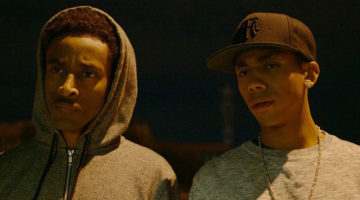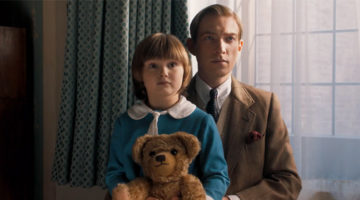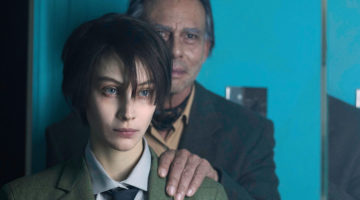Review: The Book of Henry
Colin Trevorrow returns with a tonally-mystifying misfire.
There might by a good film somewhere within Colin Trevorrow’s The Book of Henry. This definitely is not it – not by a long shot – but there are implications of a feasible narrative throughout, one that Trevorrow teases at before lambasting his audience with a ridiculous plot twist.
Naomi Watts stars as Susan, an irresponsible mother of two young boys. She leaves the responsibilities to her eleven-year-old son Henry (Jaeden Lieberher), a savant with an unduly mature demeanor. Henry keeps the family’s finances stable due to an expert maneuvering of the stock market. Susan spends her days waiting tables at a diner, the money is unneeded, yet Susan feels she must make herself necessary. When she’s at home she sits on the couch playing video games – Watts of course just smashes buttons in a way that is entirely nonindicative of actual video game play. Then there is younger son Peter (Jacob Tremblay) who is pretty useless and mostly just makes grand reactionary faces. Since a time that precedes the beginning of the narrative, Henry has suspected that his classmate and neighbor Christina (Maddie Ziegler) is being abused by her stepfather Glenn (Dean Norris). With Glenn being the well-respected police commissioner, no one seems to want to get involved. The school principal insists that Henry has no proof, while the people of child protective services have fallen under Glenn’s influence. Thus, Henry decides to take matters into his own hands, crafting the perfect plan to kill Glenn Sickleman.
At first, there’s something inherently charming about Trevorrow’s sense of youthful whimsy that pervades the film. He clearly has some sort of fascination with the imagination of children, something just touched on in his last film Jurassic World. The film has such a confidence in Henry, yet as an audience member, the whole thing is a little hard to swallow. Lieberher plays the role quite well, but the words coming out of his mouth seem more suitable for someone in their late twenties entering a millennial crisis. This is likely Trevorrow’s intention, but the characterization proves to be far more alienating than it is endearing.
The film crashes near the mid-point when a plot twist – perhaps a plot development is a better phrase – pushes the film from unbelievable to just plain absurd. As Trevorrow restructures the story, picking up fallen pieces and rearranging them in chaos, Watts is put under the pressure of taking the mess of it all on her shoulders. The talented actress – who really needs a new agent – struggles to figure out how to play what the director is giving her. It makes absolutely no sense from a real world point of view, but Trevorrow presents the new plot with such an assured hand, that there is no way to interpret it besides the deadly serious. The onscreen result somehow turns from maudlin to laughable as Susan makes all the right moves in a very wrong direction.
One cannot deny the fascination that goes with watching The Book of Henry. Colin Trevorrow’s film is one that is perhaps only producible due to the massive financial success of the director’s Jurassic World. Otherwise, financiers would have likely balked at the prospect. Nevertheless, the film features a few talented actors struggling to interpret the tonally puzzling material, and that in itself warrants a viewing.









